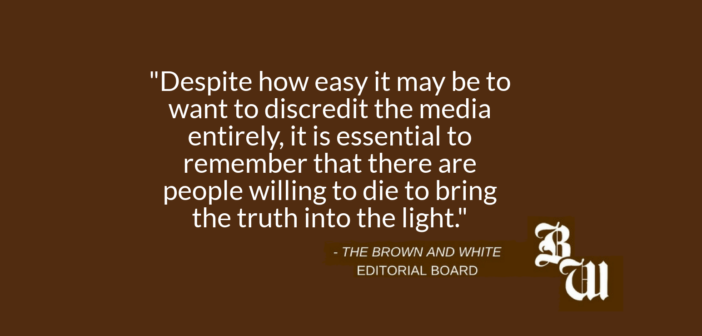As journalists, we are taught that our commitment is first and foremost to the truth. Our primary role is to serve as watchdogs on power or, in simpler terms, to hold those in charge accountable.
To some, this commitment was taken so literally that they risked their lives in pursuit of the truth.
In 2018 alone, 53 journalists died on the job, according to PBS.
We lost 53 purveyors of truth, whose commitment to the fundamentals of journalism were so prominent that they were willing to die to expose the truth to the public.
In an era of technology and fake news, we are experiencing an information overload. It is sometimes easier to disregard the news entirely than to dissect what outlets we can and cannot trust.
A Washington Post advertisement that aired during Super Bowl LIII, titled “Democracy Dies in Darkness,” addressed this exact issue.
The advertisement addressed that without the life-threatening work of journalists, the public would be in the dark about issues that potentially affect them. While the advertisement represented some of the work that journalists and reporters have done, it was not received positively by all viewers.
It is undeniable that the world of print journalism is amidst its greatest downturn. The era of smart technology and constant internet connectivity has made it possible for anyone to share his or her beliefs instantaneously.
While the increase of citizen journalism proves that the need to be informed is as prominent as ever, it has subsequently created an atmosphere of increased biases and overall media distrust.
As a result, journalists’ credibility has taken a severe hit. National news outlets have been dragged down among reputations of biases, leading to mass layoffs and thousands of journalists out of work.
The cost of running a 30-second ad during the Super Bowl was $5.2 million, according to CNBC. The Washington Post spent over $10 million to get its message out to the public. Critics of the advertisement, many of whom took to Twitter, believe that this money would have been better spent on creating new job opportunities.
In 2013, Amazon founder Jeff Bezos purchased The Washington Post. An undeniable promoter of the importance of journalistic truth, Bezos’ wealth created skepticism in the ad’s reach and impact.
Some believe that those with great financial power already have too great of a say in society.
Regardless of how the ad was paid for, Bezos and the Washington Post took a step outside of the box. The advertisement makes a statement about the importance of a reliable press.
As Americans, freedom of the press is something we often take for granted. While the media undoubtedly creates conflict, the ability to publish our thoughts and beliefs is a privilege that is not afforded to many worldwide.
We live in an era where the most common discussion surrounding the press is how it is untrustworthy. Due to the extreme abundance of diverse opinions available, there are seemingly credible sources for any idea or belief, ranging from moderate to extreme, and anywhere in between. As consumers of mass media, it is our responsibility to educate ourselves on the abundance of information and decide what we believe to be true.
While it can be disheartening to expose ourselves to the harsh realities of the modern world, it is our responsibility as citizens in a free democracy to remain informed.
Despite how easy it may be to want to discredit the media entirely, it is essential to remember that there are people willing to die to bring the truth into the light. If nothing else, we owe deep respect to those who risk their lives in an effort to hold those in charge accountable and those at risk informed.






Comment policy
Comments posted to The Brown and White website are reviewed by a moderator before being approved. Incendiary speech or harassing language, including comments targeted at individuals, may be deemed unacceptable and not published. Spam and other soliciting will also be declined.
The Brown and White also reserves the right to not publish entirely anonymous comments.